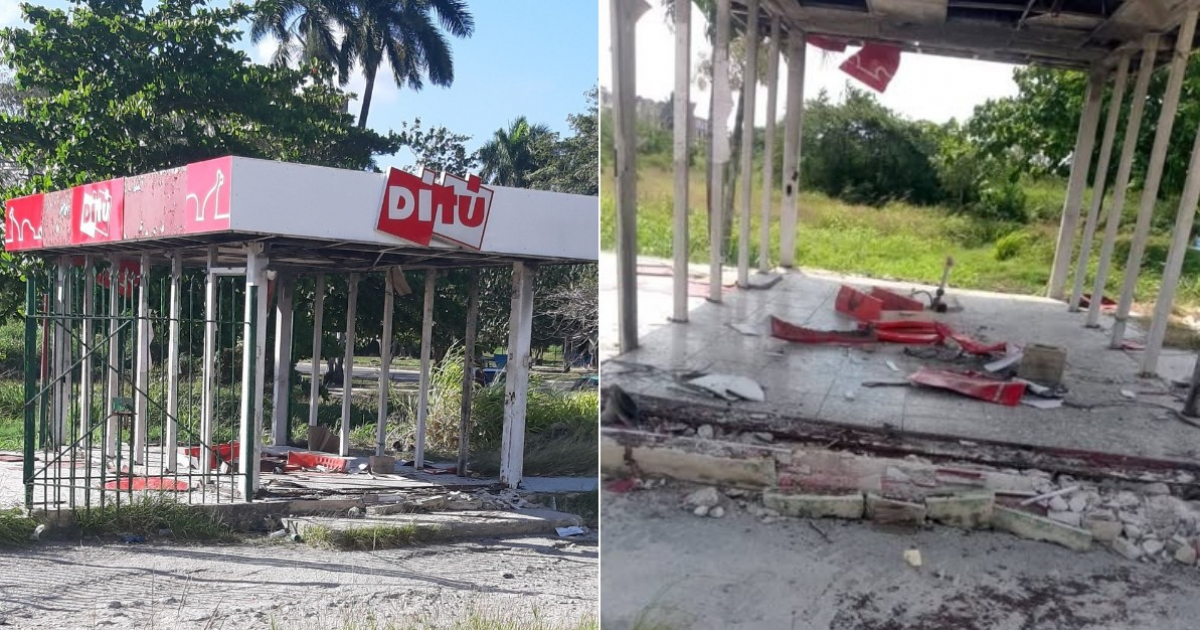In a stark illustration of institutional neglect, the state-operated DiTú outlets, once bustling with offerings like croquettes, sausage, chicken, beer, cookies, and ice cream, are crumbling without intervention from the authorities. The latest casualty is the DiTú in Bahía, located in Havana del Este, which was highlighted by user María Salazar Azucarmanía on a Facebook group titled "Reparto Bahía / Antonio Guiteras / Habana del Este."
The images shared depict a scene of decay where a once-popular spot for light snacks has been reduced to rubble, with only tiles and columns standing as remnants of its former self. "What remains of the DiTú in Bahía," María lamented, revealing the harsh truth: a once-functional service has vanished, likely stripped of its materials.
Commenters quickly voiced their outrage, some wondering if a hurricane had swept through the area. "They're still missing the roof," one man quipped sarcastically. A young woman pointed out that beyond the absence of products, the place had caught fire, exacerbating the destruction. She expressed sorrow at witnessing everything taken away, pondering how even the false ceiling columns remained.
The Broader Picture of Destruction
This incident is far from isolated. Residents of Playa and Chibás have also reported the destruction of their local DiTú outlets, highlighting a widespread trend that underscores the government's disregard for maintaining these essential community hubs. "They should have rented them out, and look what they've done," a father commented, suggesting that efficient management could have ensured their preservation and utility.
The criticism becomes even more poignant given the country's ongoing economic crisis, impacting every facet of society. These outlets once provided many families with vital access to food and leisure. Their disappearance marks an irretrievable loss for the most vulnerable.
Community Voices and Government Indifference
"Without words. No chicken to sell, no croquettes, and they allowed it to fall apart," a woman lamented. Meanwhile, a local resident added, "So many memories in that DiTú, yet they don't try to save it, rebuild it, or reactivate it. Everything that brings joy to the people is lost."
The frustrations of the community reflect deep-seated discontent with the authorities' indifference and the continual dismantling of spaces that once provided relief in an environment of scarcity. The case of Bahía's DiTú exemplifies a governmental approach seemingly favoring destruction over preservation.
This neglect not only signifies a lack of interest in small societal achievements but also burdens citizens who watch as available options dwindle in an already challenging context. In times of crisis, every lost space is a direct blow to the community. Without policies promoting repair and conservation, the lingering question is: why let everything deteriorate instead of seeking solutions that would benefit the people?
The criticisms continue to mount as DiTú outlets fade into obscurity, much like many other initiatives that once improved daily life for Cubans.
Understanding the Decline of DiTú Outlets
What caused the decline of the DiTú outlets in Havana?
The decline of DiTú outlets in Havana is attributed to institutional neglect and a lack of maintenance by the authorities, leading to their deterioration and disappearance.
How did the community react to the destruction of the DiTú in Bahía?
The community expressed outrage and sorrow over the DiTú's destruction, highlighting its past importance as a source of food and leisure and criticizing the authorities for allowing it to fall apart.
